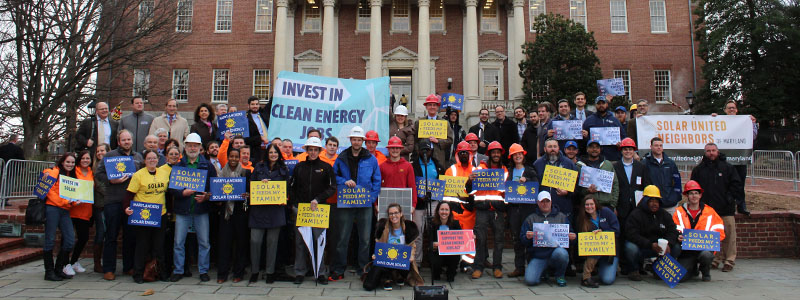Solar win in Virginia: Solar advocates stopped APCo’s threat to net metering
- Energy democracy & policy

Solar owners and supporters in the Virginia panhandle can breathe a sigh of relief. Monopoly utility Appalachian Power Company (APCo) lost its bid to take away the fair credit that solar owners earn on their bill from excess electricity they generate. The State Corporation Commission (SCC), the appointed body responsible for setting the rules around energy in Virginia, rejected the company’s request last month.
Solar United Neighbors (SUN) worked with other intervening parties to fight this proposal at the SCC. With the help of solar supporters like you, we won. Below, learn about net metering, what APCo wanted to take away in their proposal, how the proposal would have hurt all APCo customers, and how solar supporters were able to defend this important right.
What is net metering?
Imagine you are a solar owner (you might already be!) and in a sunny month your system produces more energy than your home consumes. In a fair system, you should end up with a negative bill credit, and that credit should carry over to next month’s bill like rollover minutes on an old cell phone plan.
That’s the idea behind net metering. Net metering is the policy that enables you to be credited for solar electricity production, allowing you to offset your electric bill. This policy helps solar owners pay off their system more quickly, making solar more financially accessible.
What APCo tried – and failed – to do
Virginia law requires the SCC to periodically review utilities’ net metering policies. They do so through a formal proceeding where both the utility and outside parties can present comments and evidence.
APCo’s net metering proceeding began in September 2024 with APCo’s proposal of only crediting excess solar energy at 4.9 cents per kWh (the current full retail rate credit is around 16.4 cents). APCo also proposed changing the netting period to be instantaneous, instead of a 12-month netting period.
This drastic proposal would have been unfair to Virginians seeking to hedge against rising utility costs. It would have taken away a fair policy that enables more people to go solar in APCo’s service area. Solar businesses, who rely on fair solar policies, would have been less able to provide well-paying jobs that support the local economy. And finally, all APCo customers would have felt the pinch of rising energy costs because more local solar lowers costs for everyone.
Outcome: A win for all APCo customers
In August, The State Corporation Commission (SCC) released their order on APCo’s net metering case. We were successful in defending and preserving the full retail rate (1:1 credit) of net metering over a 12-month netting period! Though the avoided cost rate for excess generation netted beyond the 12 month period was reduced (5.6 cents), full retail value was preserved. The SCC agreed with SUN and other intervenors that:
- 12-month netting is essential and beneficial to any customer generator and any net metering program.
- The 6% RPS cap, or net metering cap, should be left intact – not reduced, as APCo proposed. This means that APCo is required to have 6% of their peak load come from customer-owned solar (or net metered customers).
How solar advocates stopped APCo
Solar advocates banded together and submitted comments to show their support for net metering. They included their personal testimonials about why net metering was important to them. These public comments made a big impact when the SCC was making their final decision about this proposal.
This win will also help set the precedent for the Dominion Energy net metering case, which began in May. Dominion Energy is threatening net metering just like APCo was, but APCo’s case shows that utility monopolies can be stopped with action.
Join our mailing list below to stay in the loop on how you can stop Dominion just like we stopped APCo.
And take a moment to celebrate this huge win for solar and for all Virginians.
Get the latest on solar straight to your inbox.
Fight for your solar rights.
Everyone has the right to go solar. Spread the sunshine nationwide and in your local community by taking action, joining events, and more.